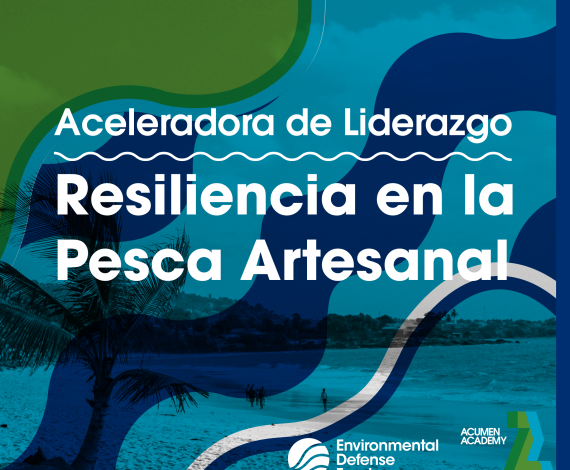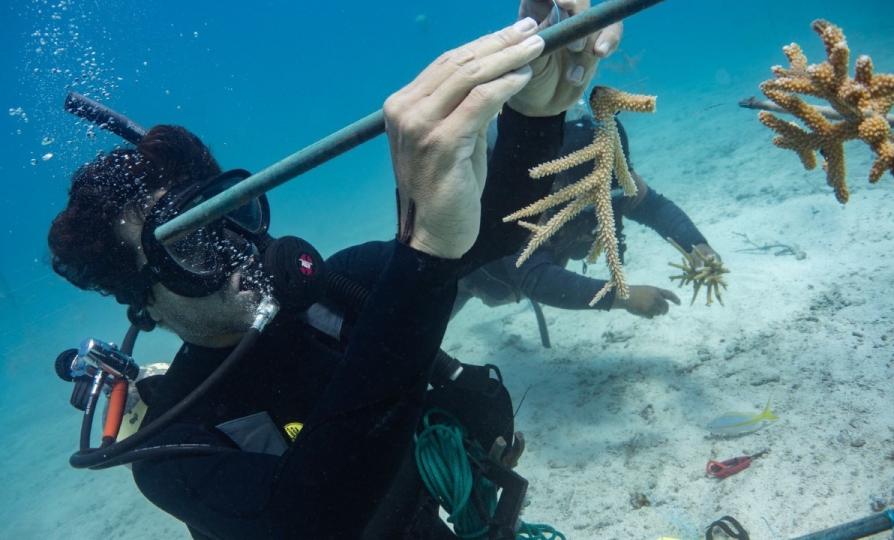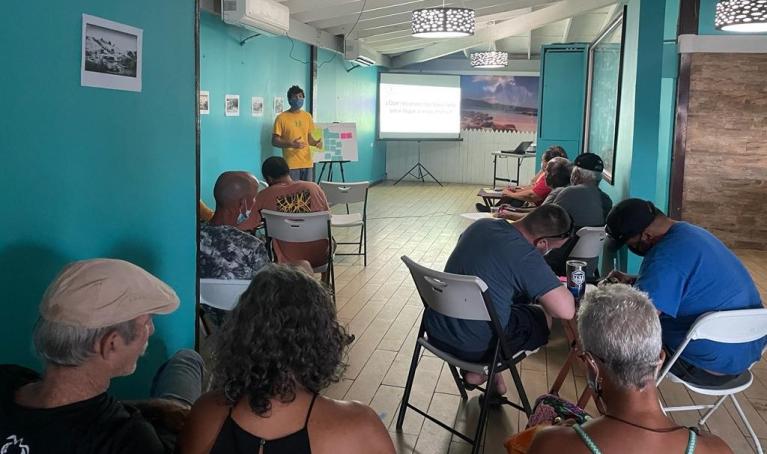
Calling all fisheries leaders in Latin America!
In partnership with Environmental Defense Fund, Acumen Academy is launching a Resilient Small Scale Fisheries Leadership Accelerator designed specifically for leaders in LATAM.
During the 13-week program, cohort members will explore their unique leadership style. They'll dive into and apply key leadership lessons, such as polarity management, conflict resolution, and adaptive leadership, and together, build a sustainable, resilient ecosystem across LATAM.
This program is for you if you are:
- Willing to push yourself outside your comfort zone and grow
- Ready to navigate difficult situations, resolve conflicts, and bridge divides
- Living in a Latin American country and have over 5 years of experience leading fisheries initiatives
- Already driving social impact in your workplace or community
Last summer, Acumen Academy and Environmental Defense Fund launched a new Leadership Accelerator program for small-scale fishers from around the globe leading initiatives towards climate-resilient fisheries. To understand the impact of this type of program, we are republishing an interview with Nico Gómez Andújar, a participant from the inaugural class.
March 2023
This article was originally published on August 29, 2022. See the original post here.
How one leader is using the Resilient Small-Scale Fisheries Leadership Accelerator to keep the fishing industry moving forward in his region

In order to create fisheries that can withstand the changing climate and social environment, leaders must inspire their community and drive action toward a more sustainable future.
Nicolás “Nico” Gómez Andújar is making it his mission to do just that. As a participant in our Resilient Small-Scale Fisheries Leadership Accelerator in partnership with Environmental Defense Fund, Nico has been diving into invaluable lessons. The skills he’s currently learning in the program are designed to help him navigate uncertainties and change among a powerful network of like-minded peers. Given his multiple leadership roles, he’s especially excited to promote sustainability and facilitate communication within the various fisheries communities he works with.
Based in Puerto Rico, Nico serves in three main leadership roles. He’s a research technician at Sociedad Ambiente Marino, where he studies coral reefs. He's also the Secretary on the Board of Directors for the newly-formed Asociación Pesquera de Culebra (Fisher's Association), where he manages local and external resources and facilitates a system of “self-organization,” giving organizations the tools to problem-solve independently. His last role is as the Community Development Facilitator at Mujeres de Islas, a non-profit focused on women and children that aims to bring food security to Puerto Rico.

Having left the industry to pursue his studies, Nico describes his return to small-scale fishing as an unexpected twist of fate in his life. “It’s kind of a serendipitous path,” he explained. Born and raised on Culebra, an island municipality of Puerto Rico, Nico is no stranger to the industry of small-scale fishing — it runs in his family. However, his initial aversion to the trade propelled him to explore higher education in marine conservation, which eventually connected him back to human communities. He quickly learned that “conserving and managing marine resources or any type of natural resource is really about interacting with people and understanding better human behavior and what our needs are.”
As his career path led him towards more human-centric work, Nico realized he needed develop his leadership abilities. He was beginning to manage broader conflicts in the small-scale fishing industry, specifically around “things that are very hard to untangle and that don’t have a clear answer, such as in poverty and equity.” And with magnified stressors, such as back-to-back hurricanes caused by climate change, he wanted to be able to address mounting struggles in a productive way. Around this time, he stumbled across the new Resilient Small-Scale Fisheries Leadership Accelerator.
USING POLARITIES MANAGEMENT TO NAVIGATE OPPOSING VIEWS
An often enlightening element of the program is unpacking the idea of Polarities Management. The practice of managing polarities helps us develop the skills to identify and carry contradictory but interdependent beliefs. In practice, it allows us to create effective, proactive, and nuanced decisions in the face of opposing viewpoints and difficult conversations, and can help leaders investigate the history behind conflicts and tensions.
In managing collectives built on cooperation, Nico had to learn how to weave information coming from different — and sometimes contradictory — sources into agreeable action. “The polarity of small-scale fishing that we face almost constantly is centralized management — and the rules come from the top down — versus the community consensus of how we should and need to manage our local resources.” Polarities Management can inspire him to investigate the history behind conflicts and tensions, and reach agreements between governance and workers on the ground.

Sources of tension don’t always stem between the top and the bottom, and conflicts can occur among fishers themselves. Nico recalled witnessing an instance in his father’s work when a boat was burned down due to a disagreement. He wanted to ensure that these issues could be better managed and deescalated under his leadership.
“A real challenge for me in this adaptive work has been understanding why my community has been so defensive towards a new fishing association — or any type of formal arrangement — that would unite their cooperation which has existed informally for the past 15 years or so,” he expressed. “It has to do with politics [and] the exclusion of people in the past.”
This accelerator has also helped Nico explore his personal challenges with developing the confidence both to lead and to manage others’ losses. However, he’s now empowered to view his own difficulties as opportunities to grow his leadership abilities. “[Recognizing] the tensions between aspects of our personal and professional lives can help us anticipate the learning curve of our leadership work,” he reflected.
THE TRIAL AND ERROR OF ADAPTIVE LEADERSHIP
When working with people who are used to a particular style and way of doing things, Nico realized he needs to be more sensitive and careful in choosing strategies that unite everyone. “I’ve had to change tactics,” he admitted. “For example, instead of relying on group meetings, it has had to be more of an individual conversation as we get everybody on the same page and recognizing our real needs of food and security.”
Adaptive Leadership is at the core of the Accelerator — a leadership style and technique that embraces how to facilitate change in times of uncertainty. “In this program, I’ve learned the concept of experimentation or ‘dancing on the edge,’ the gray area between authority and informal social relationships that allow community members to feel safe and have a team.” He understands that challenging the status quo, implementing intervention, and applying trial and error will inevitably lead to disappointments, but he also views this process as a “blueprint” for how to frame other small-scale fishing projects in the future.
Having previously developed a narrow view about conservation, Nico observed that the system was much more complex than his perspectives from academia and his family of fisherfolk. “I don’t think we would be in our community where we are now if we hadn’t taken the time to talk to other people that we might have a preconceived idea about.”

Nico realized that his effectiveness as an emerging leader in his sector doesn’t need to involve immediate drastic change and might come in smaller steps. As he learned in the program, “It’s not about charging with the flag into a battle, it’s about perhaps proposing something small.”
When asked about advice he might pass along to new leaders in small scale fisheries, he had a very actionable response. “Talk to everyone, from managers to different types of fishers, and not just the people that harvest, but also the workers that build the gear, that repair the motors, that create the nets, that process and sell the catch. And be open about your perceptions of what is working and what is wrong.”
Ultimately, Nico has set values and a clear vision from the accelerator to guide his leadership strategy: “working towards what’s good for vulnerable people and ocean resources.”
The SSF Hub was able to follow up with Nico to ask a few questions for the upcoming Leadership Accelerator cohort.
1. What advice would you give to someone participating in the next cohort of the program?
"My advice is to carve out time to prepare emotionally for the sessions and exercises, because this program gives you the opportunity to reap benefits of introspection, especially on how our identities relate to our professional calling, behavior patterns and beliefs. With busy or hectic “on the ground” schedules this can be challenging, but with the commitment to engage regularly in when this course truly becomes a guide to navigate the complexities of small-scale fisheries. Similarly, I recommend making an effort (plenty of scheduled time) to get to know other participants, especially now that the program is focused on the Latin America and Caribbean region. It was such as source of inspiration, of knowing it is possible, for me to get to know SSF leaders worldwide, their trajectories, similar challenges and unique positioning to create the changes we need to truly value the people and ecosystems around artisanal fishing."
2. What is something you learned from other participants in the program?
"I learned from everyone of the participants! As the youngest of the cohort, I was surrounded by a lot of wisdom rooted in experience that intersected different community, government, business and non-profit approaches to tackle specific viability, sustainability elements of fisheries.You can’t help but relate their stories and work to your own context and ask, would this work here? I learned how to be patient with the change we wish to see. Even short-terms interventions have lag-times to see it’s effects. I also learned from them that while we need to be critical of our work, constant diagnosing can erode our confidence. I was encouraged to trust myself and to balance sacrifice with self-care as to not burn out."
3. How has your journey evolved since then?
"I believe that in the 6 months or so since finishing the program, my work in small-scale fisheries has been more grounded. Collaborations have been built, initial funding has been secured and community support is peaking as we start to engage with tangible actions. Personally, I feel more confident to assert my voice as a fishing leader in spaces of traditional power - and that has come from trusting those community peers around me, and accepting the trust they themselves place on me to uphold our local needs and values. …I am also more calm, or less anxious, about perceived conflicts between entities that seemingly have different stances. This is part of being part of a diverse human ecosystem with multiple needs and possible courses of action. I keep reminding myself that most of us working locally share way more common interests than what separate us, which we need to recognize to be able to communicate clearly our values and stances, as we strive toward sustainability, equity, and well-being goals."
This article is part of the SSF Highlights series of articles published regularly to the SSF Hub. To read previous SSF Highlights, follow this link.
